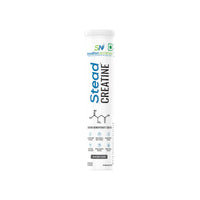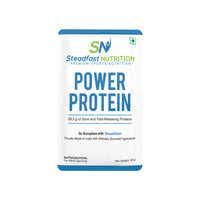Athletes and fitness enthusiasts are passionate about optimising their workout results, and two essential supplements that fuel their performance are protein and creatine. Protein, a fundamental building block of muscles, aids in muscle repair and growth. Enthusiasts relish post-workout protein shakes to replenish their bodies and support recovery. Creatine, on the other hand, enhances energy production during intense exercises, allowing for increased performance and strength gains. Its popularity among fitness enthusiasts is rooted in its ability to amplify workout intensity. The synergy of protein and creatine in a fitness regimen is a cherished combination, contributing to muscle development, muscle recovery, muscle building, improved endurance, and peak physical form.
Creatine Vs protein: A Quick Comparison
Composition:
- Creatine: A naturally-occurring compound found in small amounts in certain foods and synthesised by the body.
- Protein: An essential macronutrient composed of amino acids, found in various foods like meat, dairy, and plants.
Purpose:
- Creatine: Enhances short-term energy production in muscles for high-intensity activities like weightlifting and sprinting.
- Protein: Supports muscle repair, growth, and overall body functions.
Mechanism:
- Creatine: Increases the body's store of phosphocreatine, providing rapid ATP regeneration during intense exercise.
- Protein: Provides essential amino acids for muscle protein synthesis and other bodily processes.
Athletic Performance:
- Creatine: Improves power, strength, and muscle endurance during brief, high-intensity efforts.
- Protein: Aids in recovery, muscle repair, and maintenance for both short and long-term performance gains.
Dosage:
- Creatine: Typically taken in daily doses of 3 grams.
- Protein: Daily intake varies but is generally recommended at around 0.8-1.2 grams per kilogram of body weight.
Timing:
- Creatine: Best taken before or after workouts to maximise uptake by muscles.
- Protein: Can be consumed throughout the day, with an emphasis on post-workout intake for recovery.
Sources:
- Creatine: Found in small amounts in meat and fish, also available as a supplement.
- Protein: Abundant in foods like meat, poultry, fish, eggs, dairy, beans, and plant-based sources like tofu and quinoa. Athletes and fitness enthusiasts should opt for supplements since they require higher amounts of protein than an average individual and may not be able to meet this requirement through the diet alone.
Safety:
- Creatine: Generally safe when used as directed; minimal side effects reported.
- Protein: Safe as long as it’s consumed within recommended levels.
Goals:
- Creatine: Ideal for athletes seeking short-term performance gains and explosive power.
- Protein: Essential for anyone looking to maintain or build muscle, support overall health, and meet daily protein needs.
Complementarity:
- Creatine and Protein: Can be used together to optimise muscle performance and recovery, as they serve different purposes.
In summary, creatine and protein are distinct supplements that cater to different aspects of athletic performance and fitness goals. Creatine enhances short-term energy production, while protein supports long-term muscle health and overall bodily functions. When used appropriately, they can complement each other effectively in a well-rounded fitness regimen.
However, it's crucial to remember that protein powder or creatine supplements should not replace a well-balanced diet. Whole foods including carbohydrates, fats, and vegetarian or non-vegetarian protein sources should always be the foundation of your nutrition plan, with supplements used as additions when necessary. Additionally, consulting with a healthcare or nutrition professional before starting any supplementation regimen is advisable to ensure it aligns with your individual fitness goals and overall health. Ultimately, the choice between creatine and protein should be based on your specific fitness needs and goals, and incorporating both can offer a well-rounded approach to achieving your desired results.
Creatine and protein powder are two widely used dietary supplements in the fitness and bodybuilding communities, each offering a range of benefits for individuals seeking to improve their athletic performance, muscle growth, and overall health.
Should we take Protein and Creatine Together?
Yes, it is perfectly safe and often beneficial to take creatine and whey protein together, as they serve different but complementary purposes in your fitness and muscle-building regimen.
When engaging in high-intensity, brief-duration exercises like powerlifting, running, and cycling, creatine is primarily utilised to improve muscle power, strength, and performance. It aids in improving performance by replenishing ATP (adenosine triphosphate), the body's primary source of energy.
Whey Protein, on the other hand, is a source of dietary protein that is rapidly absorbed by the body. It provides the essential amino acids required for muscle repair and growth. Whey protein is particularly useful for post-workout recovery as it aids in muscle tissue repair and synthesis.
Benefits of taking Creatine and Protein Together
When used together, creatine and whey protein can offer a comprehensive approach to muscle development and performance optimisation:
Improved Performance:
Creatine enhances your ability to perform better during workouts, allowing you to lift heavier weights or complete more reps.
Enhanced Muscle Growth:
Whey protein provides the necessary amino acids that support muscle repair and growth. This complements the effects of creatine, helping you recover and build muscle more effectively.
Convenience:
Whey protein is a convenient way to meet your daily protein needs, while creatine is usually taken in powder form, making it easy to mix both supplements into your post-workout shake.
Balanced Nutrition:
Combining creatine and whey protein ensures you're addressing both the energy production and muscle recovery aspects of your fitness routine.
When using creatine, which might cause more water retention in muscle cells (which is a key stimulus for muscle growth), it's crucial to stick to the suggested dosages and usage instructions for each supplement. To make sure the supplements are in line with your particular fitness objectives and nutritional needs, you can also think about speaking with a healthcare or nutrition professional. Ultimately, athletes aiming to maximise their exercises and muscle-building efforts may find that mixing creatine with whey protein is a useful technique.
If you are willing to include best creatine supplement or whey protein in your diet, it choose a premium and trustable brand like Steadfast Nutrition. Steadfast’s premium range of whey protein will amaze you and you can also try SteadCreatine from the house of Steadfast!




